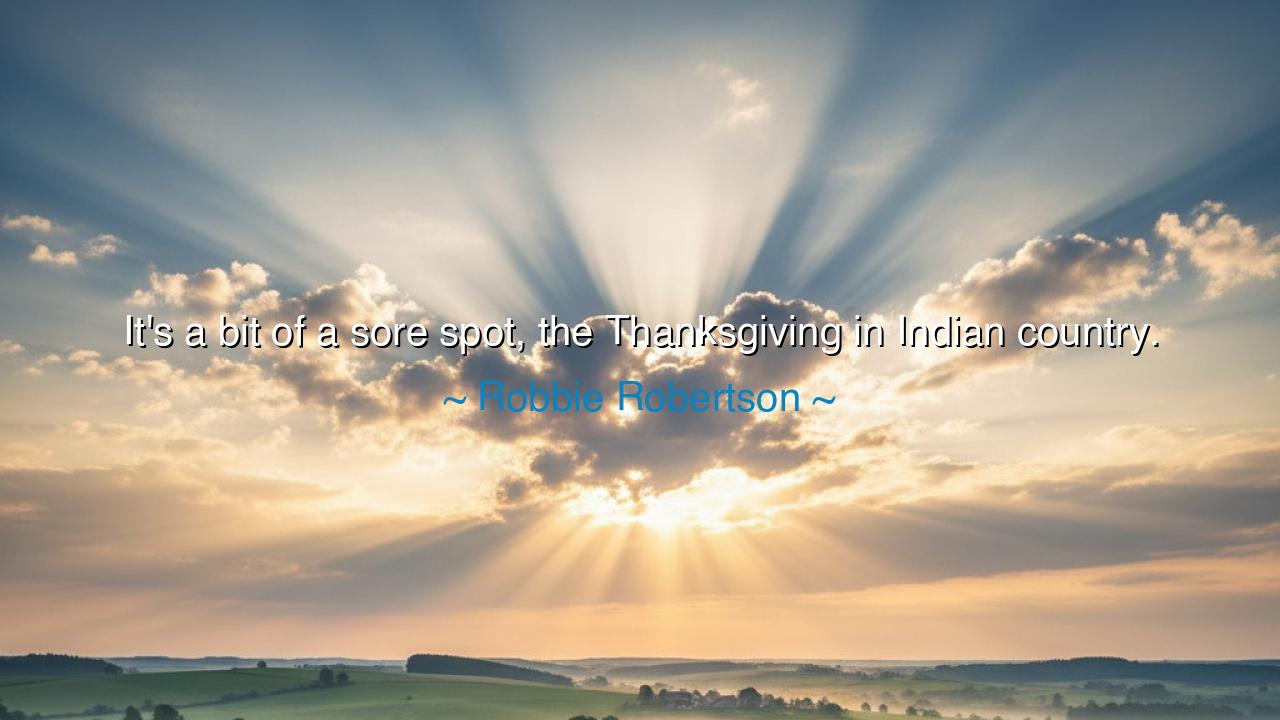
It's a bit of a sore spot, the Thanksgiving in Indian country.






In the words of Robbie Robertson: “It’s a bit of a sore spot, the Thanksgiving in Indian country.” These words, though quietly spoken, carry with them centuries of sorrow, memory, and unhealed wounds. For while Thanksgiving is often celebrated as a feast of gratitude, abundance, and unity, in Indian country it recalls betrayal, loss, and the breaking of promises. It is the shadow that falls across the feast, a reminder that what was joy to some became grief to others.
The ancients knew that every feast carries two faces. The victors may gather to give thanks for their triumphs, while the defeated grieve in silence. The Romans celebrated their triumphs with parades and banquets, yet for the conquered peoples those same days were ashes and chains. So it is with Thanksgiving: for many Americans it is a holiday of gratitude, but for Native peoples it is a day that recalls the loss of land, culture, and lives. Robertson’s words pierce through the cheerful narrative to remind us of the deeper truth, that history is never the same story for all.
Consider the story of the Wampanoag people, who shared their food with the Pilgrims in 1621. To the settlers, this first Thanksgiving was a sign of survival and divine providence. But for the Wampanoag, this moment marked the beginning of centuries of struggle, disease brought by newcomers, and the gradual taking of their lands. What was once a gesture of friendship became, in hindsight, the doorway to oppression. Here lies the sore spot Robertson speaks of: a memory that is not easily reconciled, because it holds both generosity and betrayal side by side.
In modern times, many Native communities mark Thanksgiving not with feasting, but with mourning. At Plymouth, Massachusetts, where the first harvest meal took place, Native peoples gather each year for a National Day of Mourning, to honor ancestors and to protest centuries of injustice. This is not bitterness, but remembrance—an attempt to keep alive the truth that was often silenced in the dominant narrative. For to heal, one must first acknowledge the wound, and to acknowledge, one must first be willing to listen.
Robertson’s words are not meant to deny the joy of Thanksgiving, but to complicate it. They call us to see with two eyes: one eye for the gratitude and warmth of the holiday, and the other for the pain it represents for Native people. To ignore the second is to live in illusion; to hold both is to walk in truth. The feast becomes richer when it is honest, when it honors not only the bounty on the table but also the voices that history has tried to silence.
The lesson is clear: every tradition must be remembered in full, not only in part. Gratitude without honesty becomes hollow. Feasting without remembrance becomes shallow. To honor Thanksgiving truly is to honor all its stories: the story of survival, the story of friendship, but also the story of loss and endurance among the Native peoples who still live upon the same land. To ignore their truth is to continue the wound; to recognize it is to begin the healing.
Practical action is within our reach. When you celebrate Thanksgiving, pause to remember the land on which you live and the peoples who first tended it. Teach your children not only the cheerful tale of Pilgrims and turkeys, but also the harder truths of Native endurance and resilience. Support Native voices, listen to their stories, and honor their contributions. Gratitude is strongest when it is paired with justice, and remembrance is most powerful when it leads to action.
Thus, Robbie Robertson’s words endure as a solemn reminder: in Indian country, Thanksgiving is not only a feast but a wound. And yet, by acknowledging the sore spot, by remembering fully, we may transform the day into something deeper—a time not only of thanks, but of truth, healing, and solidarity. In this way, the feast may at last become what it was always meant to be: a celebration that binds all people, not just some, around the table of humanity.






AAdministratorAdministrator
Welcome, honored guests. Please leave a comment, we will respond soon